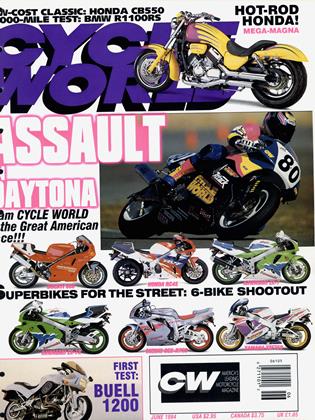ERIK BUELL
CW INTERVIEW
MAKING THE AMERICAN SPORTBIKE
MATTHEW MILES
ERIK BUELL HAS PAID HIS dues. And then some. Eight years ago, the ex-Harley-Davidson engineer and former national-class roadracer designed and built the first of several street-going motorcycles, the XR1000-powered RR1000. Now, having toiled in relative obscurity for the better part of the last decade, Buell has closed his previous concern, the Buell Motor Company, and formed the Buell Motorcycle Company, 49 percent of which is owned
by Harley-Davidson. Prior to the release of the Buell Thunderbolt, we sat down with its 43-year-old designer to find out more about his new company and its
inaugural product. Q Why did you build an
all-new motorcycle? A Initially, Harley-Davidson wanted us to continue building the RS, and concentrate on the long term. But as a new company, we needed a new product. The goal was not to produce a factory hot-rod, though. We still wanted the advantages of owning a Harley-Davidson, such as durability and low cost of service, but with a different appearance and more performance. And in terms of previous Buells, we wanted a substantial reduction
in cost. Q Harley-Davidson has traditionally been known for its laid-back cruisers and minimalist touring bikes. With the development of the VR1000 racer and now the Buell involvement, Harley has shown increasing interest in the sportbike market. What is your feeling on this, and have you met with any internal friction at
the factory? A From the outside, one might see it as a surprise. From a long-term perspective, though, Harley-Davidson needs to diversity. Buell provides that opportunity. The image of two companies is very different. We’re after a completely different market, a different customer. There has been some confusion (at H-D), but it wasn’t so much friction as a lack of knowledge. At the executive level, everyone understood. At the other levels, they had to do a lot of research to understand
the product. We have a strong commitment from Harley-Davidson. We both had to go in separate routes to get to this point, to gain our own identity. It’s a
great combination. Q How many motorcycles will you produce
this year? A About 800. We should have 150 Buell dealers by the end of the year. Harley-Davidson is in charge of marketing, public relations, sales and service. It’s a separate franchise agreement, though; it doesn’t automatically go with a Harley-
Davidson dealership. Q A strong selling point for Harleys is the amount of accessories available to personalize a bike. Will be there be a range of add-ons for Buells, say if a rider roadracing class. turn the bike into more of
a sport-tourer? A Yes. We want buyers to customize the bikes. All of the accessories will be easily removable. Fairing lowers, for example, will come off with two screws and a clip, and store in a little bag. Saddlebags will have interchangeable outer shells; a shallow' one will carry a notebook computer, for example, or a change of clothes, the deeper one will be large enough for a full-face helmet. We really want the bikes to have lots of personality-color options, a couple of wheel choices-so each one will be unique, and suited to each customer. There are lots of combinations, and of course you can always tinker with
the engine. Q Are you planning to expand
the line? A We would like to have a full range, covering areas where we see opportunity. As long as the Sportster engine is available, we will continue to use it. That’s the classic Buell. Harley-Davidson is committed to making a special Buell engine for these bikes, but the current Harley-Davidson product line will not dictate what we offer. We certainly want to look at other alternatives like sport-touring and mid-displacement machines. A super-high-performance sportbike is also
a possibility. Q Based around the
VR1000 engine? A Obviously, the VR engine is interesting. It was clearly built as a race engine, but we will look at it and see what the possibilities are for street use. Right now, we’re not sure what the price of these engines
will be. Q Who is
your customer? A To me, motorcycling is more than a product at a price. We must give the customer something...something intangible. People will pay for that. The kind of customer we want would be receptive to keeping the bike for several years. Many sportbikes don’t have much continuity of existence; they’re shortlived because they have such a high performance target. My feeling is there are a lot of people who don’t require that. The idea is that the bike won’t go out of style in two or three













